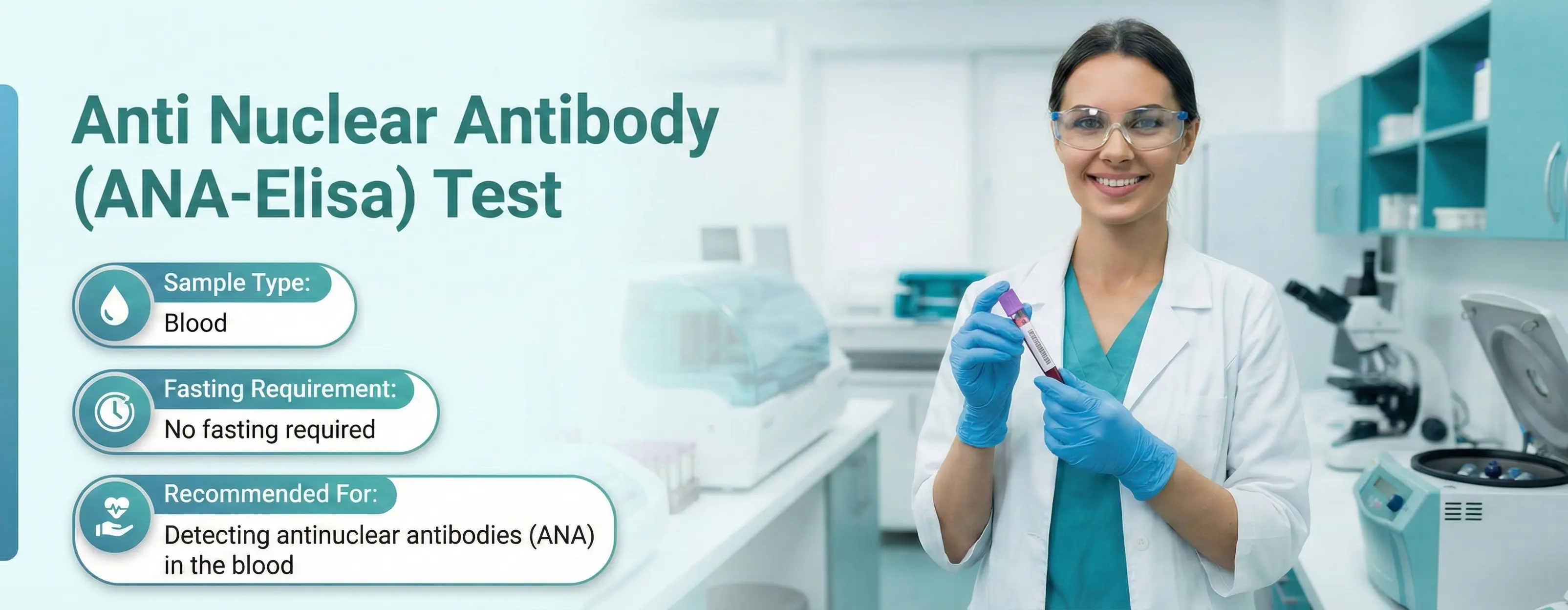78+ orders placed in your location
100% NABL & ISO Certified Lab • 100% Accurate Reports
Anti Nuclear Antibody (ANA-Elisa) Test
Antinuclear antibody test, ANA test
- SummaryAnti Nuclear Antibody (ANA-Elisa) Test is a blood test used to detect the presence of antinuclear antibodies in the blood. High levels of ANA often indicate an underlying autoimmune disorder. The test is done through a blood sample, and fasting is not required.Read more
- Reports Within18 HrsView Sample Report100% NABL & ISO Certified Labs
- SampleBlood
- AgeAll Age Group
- GenderMale and Female
- FastingNot Required
PharmEasy Promises
Know More About The Test
A quick info on ANA test
Overview
The antinuclear antibodies bind to the contents of the nucleus of the cell. In some cases, the body produces antinuclear antibodies, which are antibodies against human antigens.
There are many subtypes of ANAs such as,
- Anti-Ro antibodies
- Anti-La antibodies
- Anti-Sm antibodies
- Anti-RNP antibodies
- Anti-Scl-70 antibodies
- Anti-dsDNA antibodies
- Anti-histone antibodies
- Anti-centromere antibodies
- Anti-sp-100 antibodies
These antibody subtypes bind to different proteins or protein complexes within the nucleus.
The ANA test detects the antinuclear autoantibodies present in a patient's blood. The standard tests used for detecting and quantifying ANAs are enzyme-linked immunosorbent assay (ELISA). The enzyme-linked immunosorbent assay (ELISA) is a commonly used analytical biochemistry assay.
A doctor may recommend an ANA (Elisa) Test when you have symptoms of autoimmune diseases like severe fever, difficulty in breathing, vision difficulty, hair loss, weakness, abnormal growth, severe abdominal pain, and many more.
When the test results are positive and show a high positive presence of antinuclear antibodies in your blood or serum. In that case, you may have severe autoimmune-related disorders and diseases like Sjögren's syndrome, Autoimmune hepatitis, polyarthritis nodosa, rheumatoid arthritis, dermatomyositis, and several other health complications.
Study results among US adults aged 12 and older indicate that 13.8% have ANA-positivity, compared with 12.3% in India.
Sample Type
A simple blood sample or blood serum is needed to endure an antinuclear antibody test. This test does not require any specific preparation.
Risk Assessment
Autoimmune diseases, Polymyositis, Drug-induced lupus
What does this test detect?
The ANA (Elisa) Test measures the presence of antinuclear antibodies in the blood. ANA test results that are positive or abnormal may affect the blood or organs in various ways.
Antinuclear antibodies can be detected in 20% of healthy people despite not having an autoimmune disease.
A false-positive result is more likely in the case of:
- An infection such as mononucleosis or tuberculosis.
- Anti-seizure medicine or blood pressure medication.
- Are a woman age 65 or older.
Indications for ANA Test
Your doctor may recommend an ANA (Elisa) test if you have symptoms that include or are related to different parts of the body.
Some symptoms are:
- Fatigue
- Recurring or persistent fever
- Difficulties or shortness in breathing
- Skin rashes
- Sores on the skin
- Abdominal discomfort, cramps, or severe pain
- Bleeding in the rectus
- Diarrhoea (continuous passing of watery stool)
- Difficulty or permanent loss of hearing
- Itching, stiffness, or redness in the eyes
- Vision complications like blurred vision or permanent loss of vision
- Running nose
- Tiredness or weakness
- Hair loss
- Numbness and tingling in hands or feet
The doctor may suggest an ANA (Elisa) Test if the person has already detected diseases or disorders like:
- Raynaud's syndrome- A condition that makes your fingers and toes turn blue and feel cold.
- Thyroid diseases (due to dysfunction or abnormal thyroid gland).
- Lung diseases like pulmonary fibrosis.
- Inflammatory bowel diseases.
- Liver diseases like autoimmune hepatitis, liver cirrhosis.
- A cancerous tumour.
- Infections caused by viruses.
If the test results of the ANA (Elisa) Test show high positivity in the blood, the diagnosis of any autoimmune diseases has to be ruled out in that case. You need further treatment and monitoring by a consultant physician, rheumatologist, or immunologist. A doctor may also recommend you a repetitive ANA Test for three months.
A doctor uses nonsteroidal anti-inflammatory drugs like ibuprofen and naproxen in treating a patient with a high positive ANA in blood. Several medications are available for Lupus patients, including hydroxychloroquine or chloroquine to reduce inflammation.
How frequently should you take this test?
Your doctor may recommend you repeat an ANA Test every three months if you find recurrent symptoms or your previous test results show a positive presence of antinuclear antibody in your blood.
If previous ANA test results are negative, you can repeat your test on an annual or recurrent symptoms basis.
Test Preparation
Before the test
Generally, no special preparations are required for the ANA test. If your doctor recommended this test along with another one, your healthcare provider may advise avoiding certain foods. It is always a good idea to consult your doctor before any test for the best results.
During the test
A blood sample will be taken from a vein in your arm. Here is what you can anticipate during the test:
- The phlebotomist will cleanse the area where the needle will be inserted with an antiseptic.
- A tourniquet will be placed around your arm to make the veins more prominent.
- A needle will be inserted into the vein to draw blood. This process may cause a brief pinch that lasts a few seconds.
- The blood will be collected in a vial or small test tube and a label on the vial will be filled up with your information.
After the test
Once the blood has been collected:
- A bandage will be applied to the puncture site to stop any bleeding.
- Mild bruising is normal. Some people feel dizzy, and in such cases they are advised to sit for a few minutes.
- If you notice bleeding, pain, or rashes at the puncture site, contact your healthcare provider.
Parameters
Antinuclear antibodies are autoantibodies, which might affect the nucleus of your healthy cells in your body. The Antinuclear Antibody Test measures the presence of antinuclear antibodies in your blood.
It also helps in confirmation of the diagnosis of some autoimmune diseases. The high positive presence of ANA in the blood can cause severe health complications.
Ranges
The positive presence of antinuclear antibodies can affect the patient's health. At the same time, negative presence does not affect the patient's health—the normal ranges for detecting antinuclear antibodies.
- The average or negative presence of ANA titer is measured as less than or equal to 1:40.
- The average significant results of ANA titer are measured as 1:80 or lower.
- The strongly positive ANA titer is measured in between the 1:160.
These expected ranges may vary with several laboratories because different laboratories have different methods of testing.
The normal values, parameters, and reference ranges of the test may vary from lab to lab. Please refer to the ranges mentioned in the report and consult a doctor to understand the interpretation of lab reports.
Test Result Interpretation
There are mild to severe health problems due to the high positive presence of antinuclear antibodies in the blood. At the same time, the negative value does not affect anyone's health.
High positive presence of ANA (Elisa)
- Sjögren's syndrome: It is a type of autoimmune disease and chronic disorder that causes insufficient moisture production in certain body glands, including the saliva-producing and tear-producing glands. In addition to Sjögren's syndrome, there are other related diseases, such as rheumatoid arthritis and lupus.
- Scleroderma: A chronic but rare autoimmune disease in which normal tissue is replaced with thick tissue with extra collagen. It most often affects the skin, and scleroderma also can affect many other parts of the body like joints, bones, etc.
- Rheumatoid arthritis: A form of autoimmune disease in which your immune system attacks healthy cells in your body, causing swelling (inflammation) in the affected parts of the body. RA mainly affects many joints, including those in the hands and feet.
- Dermatomyositis: An uncommon inflammatory disease in which muscle weakness and a distinctive skin rash on the body can develop. The condition can affect adults in their late 40s or 60s and children from 5 to 15 years of age.
- Autoimmune hepatitis: A chronic liver inflammation that occurs when your body's immune system turns against liver cells. The cause of autoimmune hepatitis is still unknown, but genetic and environmental factors can affect the disease. It can often be controlled if diagnosed or treated early.
- Polyarteritis Nodosa (PAN): It is a rare disease of autoimmune disease that results from blood vessel inflammation (vasculitis), causing injury to organ systems. The PAN most commonly affects the area of the nerves, intestinal tract, heart and joints of the body.
Negative presence of ANA test (Elisa)
The negative or typical test results of the ANA (Elisa) test mean that you don't suspect an autoimmune disorder or other health condition related to ANA.
Price/Cost
The price of an ANA Test can differ based on the city and the laboratory. Typically, an ANA test falls within the range of INR 375 to INR 935. For a better understanding, here is the average cost of an ANA test in some major cities in India:
|
City |
Min Price |
Average Price |
Max Price |
|---|---|---|---|
|
375 |
655 |
935 |
|
|
375 |
655 |
935 |
|
|
375 |
655 |
935 |
|
|
375 |
655 |
935 |
|
|
375 |
655 |
935 |
|
|
375 |
655 |
935 |
|
|
375 |
655 |
935 |
|
|
375 |
655 |
935 |
|
|
375 |
655 |
935 |
|
|
375 |
655 |
935 |
Risks and Limitations
The ANA blood test is a common blood test with a very low risk of complications. Seek medical advice right away if you notice-
- Excessive bleeding following the needle insertion.
- Discomfort or swelling at the insertion site.
Limitations of the test
- Negative impact on the outcome of the test due to equipment or human errors.
- Wrong understanding of the markers.
Was This Test Information Helpful?
Please rate your experience
References
People Also Ask
What diseases can cause a positive ANA?
Is a positive ANA test terrible?
What is an ANA test used to diagnose?
What happens after a positive ANA test?
Can stress cause positive ANA?
Have any doubts? Ask us.
Ask us anything about the Anti Nuclear Antibody (ANA-Elisa) Test to understand it better
We provide trusted, expert-curated health content to support better awareness,prevention, and care.
Backed by experienced doctors, medical experts, and strict editorial standards.


